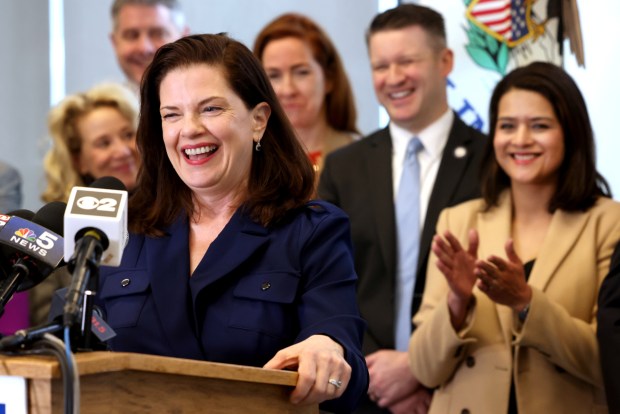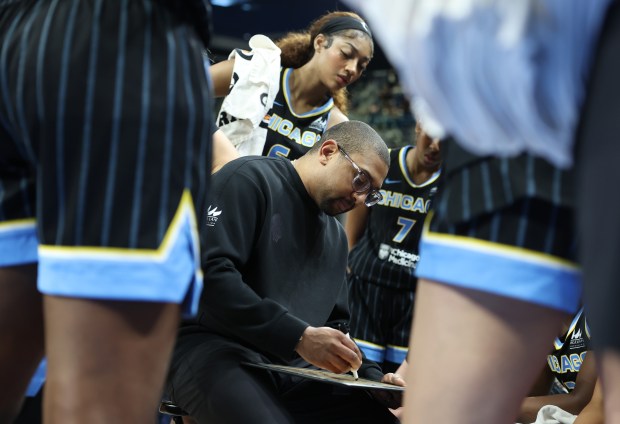After days of uncertainty, Eileen O’Neill Burke emerged as the choice of voters to be the Democratic nominee for Cook County state’s attorney, with the former prosecutor turned defense lawyer, circuit court judge and appellate judge squeaking out a win by less than 1,600 votes.
O’Neill Burke bested Clayton Harris III, a former prosecutor himself who wound through City Hall and state government, academia and corporate lobbying. She will now face Republican Bob Fioretti in the November general election.
While any Republican is perceived as a long shot to win the post, whichever candidate comes out ahead is poised to transition the state’s attorney’s office into a new era after a period of unprecedented — and sometimes contentious — reforms implemented by outgoing top prosecutor Kim Foxx.
Should O’Neill Burke ultimately win, she would quickly face formulating her own reform agenda, making cases to tamp down Chicago’s persistent gun violence, and running an office struggling with morale issues.
“As much as numbers have gone down, the amount of street crime is extraordinarily high and has a tremendous impact on the community,” said Richard Kling, a clinical professor of law at Chicago-Kent College of Law.
Based on the final hair-splitting results — which included 10 days of ballot counting following the March 19 primary — Democratic voters appeared evenly divided on whether more strident prosecutions or prioritization of diversion and prosecutorial discretion were the solution, said Jeremy Custer, the political director for Operating Engineers Local 150, which supported O’Neill Burke.
“You talk to every voter, whether perception was reality, crime was the No. 1 issue,” Custer said. “What this race boiled down to is, within the Democratic Party, there’s still a reckoning of: Is it root causes? Or do we need stronger law enforcement in holding criminals accountable?”
What’s next?
Transitions from one Cook County state’s attorney to the next are always fraught, said Alan Spellberg, a former assistant state’s attorney under multiple administrations, including Foxx and her predecessor, Anita Alvarez.
O’Neill Burke and Foxx spoke by the phone this week — a cordial call, both sides confirmed.
The office’s next prosecutor will enter during a period of particularly low morale among assistant state’s attorneys, said Spellberg, supervisor of the criminal appeals division until 2021.
He applauded Foxx’s reform-minded approach, but said prosecutors were “excluded” from the process.
“We were very much in support of the notion of reform, but wanted to be partners,” he said, adding that there “can be” disagreements on what reform is.
“If (assistant state’s attorneys) in a courtroom know what works and what doesn’t and you’re not even asking us what we think about the ideas, the ideas aren’t going to be well thought out and well executed,” Spellberg said.
O’Neill Burke ran a campaign more typical of a politician with a prosecutor background, less reform-focused than Foxx, Chicago-Kent’s Kling said.
O’Neill Burke’s stump positions included across-the-board requests for detention for certain crimes, for example.
“We will seek detention each and every time” someone is found with an assault weapon, threatens someone with a gun or commits a violent crime happens on the CTA, she told reporters Monday.
A blanket policy would be a departure from Foxx, who said the office weighs several factors when deciding detention requests under the new guidelines set by the SAFE-T Act. Though prosecutors commonly file detention petitions on offenses similar to those described by O’Neill Burke, they examine case-specific factors and request a defendant be held if they are considered a flight risk or pose a threat to public safety. Ultimately, the decision is up to the judge.
Another departure: O’Neill Burke pledged to reverse Foxx’s policy of raising the threshold for prosecuting felony retail theft from $300 to $1,000 — a key call from the business community, who said smash-and-grabs were threatening their bottom lines and customers’ feeling of safety. Though he noted the impact of theft on stores and community members, Kling said he doesn’t know “if there is the appetite to prosecute more (retail) felonies.”
“I think Eileen O’Neill Burke or any state’s attorney needs to direct primary forces to street crime,” he said.
Foxx launched the policy as one of many ways her office would move away from harsh prosecution of low-level crimes, noting that neighboring states like Wisconsin, Michigan and Indiana all had higher thresholds.
Legal observers said the next top prosecutor will step in at a critical time for Chicago as it battles persistent violent crime and reckons with large volumes of potential wrongful-conviction cases.
It is unclear to what extent O’Neill Burke will change directions of Foxx’s lodestar Conviction Integrity Unit — which has overturned at least 250 cases — though O’Neill Burke did pledge to maintain it.
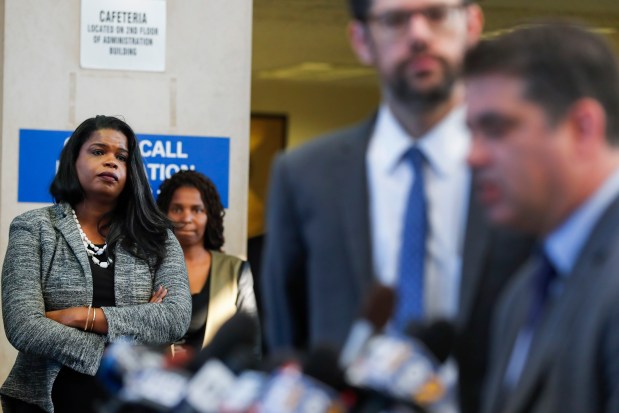
Joshua Tepfer, an attorney with the Exoneration Project who handles wrongful convictions, said the incoming state’s attorney will have to grapple with Chicago’s history of systemic police abuse by officers like Reynaldo Guevara and Jon Burge.
“I’m hopeful that she’ll be interested in speaking with people like me and my colleagues to talk about what sort of issues we have in the pipeline, what sort of cases,” he said.
Going forward, Tepfer said he hopes to see the units looking at post-conviction matters staffed with people “willing to scrutinize any case that comes before it.”
O’Neill Burke’s campaign platform called for creation of a dedicated restorative justice bureau “where juvenile, veterans, drug and mental health courts will work with government agencies to get people help, let them cross-pollinate with various social service agencies and bring people back to society instead of being stuck in a life of crime.”
In an interview with the Tribune last month, O’Neill Burke also suggested she would seek to change the current restorative justice courts, located at three neighborhood sites in Chicago, arguing they had largely become gun deferral courts rather than dealing with juveniles, veterans or those dealing with drug addiction or mental health issues.
“Converting them to gun deferral isn’t contributing to restorative justice — it’s detracting, and it’s not making anyone safer,” O’Neill Burke said, pitching a dedicated courtroom for gun cases instead.
Such a change, though, was criticized by advocates at the Chicago Appleseed Center for Fair Courts, who described it as a “misdirected waste of resources” and contended that framing the courts as drug courts is a misunderstanding of their purpose.
Appleseed put out a report earlier this year that recommended reforms, writing that the courts “are overseeing cases that would be better off dismissed from traditional prosecution at the outset,” such as low-level drug cases. The experimental courts located in Lawndale, Englewood and Avondale seek to provide a fairer version of justice than would be found at the county’s bustling courthouses. The tenets of restorative justice focus on participants making amends for the harm done to victims or the community.
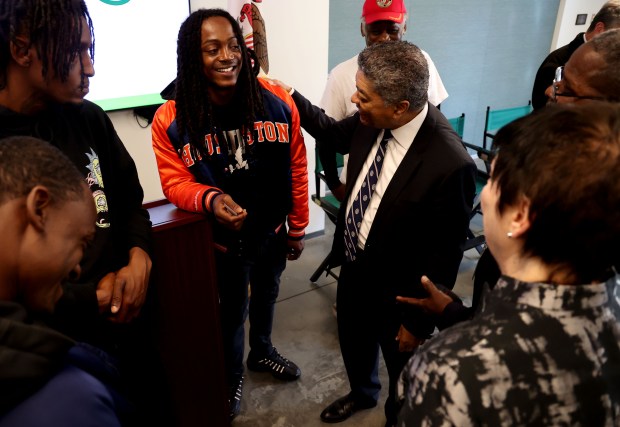
Programming for the restorative justice courts in recent years has intentionally moved away from drugs (the county also has drug, mental health and veterans courts that are distinct programs) because the victimless nature of drug offenses makes them less well-suited for restorative justice principles. Still, the program only accepts low-level and nonviolent crimes, and many of the gun offenses are faced by defendants who didn’t have proper licensing.
“Restorative justice models are uniquely positioned to address instances where harm has been done to another person or people — which is not the case with drug use or with simple gun possession,” an Appleseed spokeswoman said in a statement. “We look forward to working with whoever is elected as the next Cook County State’s Attorney to expand the eligibility criteria of the (courts) to include more charges that involve individual victims, so that the true healing power of restorative justice can be realized.”
The courts are under the auspices of the chief judge, but prosecutors decide which cases to defer to the restorative justice courts.
Matt Fakhoury, a defense attorney and former prosecutor, said it’s important for the next state’s attorney to also improve relations with the Chicago Police Department and rebuild morale in the office. The return of O’Neill Burke, a former prosecutor, if she prevails in the general election, would be like a homecoming, he said.
“Once you leave that office, you’re always a prosecutor and your heart’s always there,” he said.
How O’Neill Burke won
Some experts argued that the campaign was more nuanced than simply a tough-on-crime candidate facing off against a progressive reformer. Harris and O’Neill Burke both supported the landmark SAFE-T Act eliminating the use of cash bail and Foxx’s nonviolent offender diversion, wrongful conviction unit and restorative justice efforts. Both spoke about a need to reset relationships with police.
O’Neill Burke, though, hewed closer to a hard-charging message and became increasingly critical of Foxx. Harris’ campaign argued O’Neill Burke’s messaging allowed a more conservative support base to rally around her.
“If you think things are going just fine right now, I’m not your candidate,” she said during the sole televised debate of the primary campaign.
She also took a more hard-line stance on the office’s approach to gun crimes, carjackings and retail theft.
“The deterrence for crime is not the severity of punishment, it’s the certainty of a consequence,” she told the Tribune in June. “People have to be held accountable.”
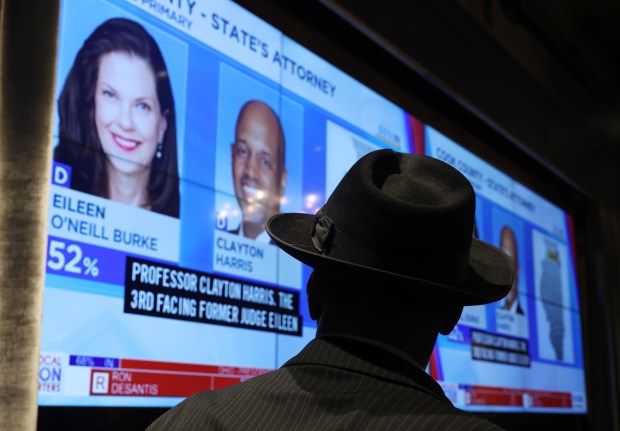
Harris was more vocally supportive of Foxx’s policies, but argued the office had to do a better job highlighting the cases it was already prosecuting and the victims it helped.
A university lecturer on race and policing, he warned reactive or hard and fast prosecutorial policies could have unintended consequences in communities of color.
“Historically, what we’ve seen is when people say ‘Safety, safety, safety’ and everyone gets behind it, what it looks like is they start rounding up people like me. They start rounding up Black and brown bodies or people that they don’t agree with,” Harris told supporters just before Election Day.
Harris and allies also repeatedly attacked O’Neill Burke for her handling of the 1994 prosecution of an 11-year-old Black boy in the slaying of his elderly white neighbor, and her response to it decades later.
Years later, the case was overturned. O’Neill Burke said she was never accused of any wrongdoing by a higher court and had no knowledge the boy’s confession was coerced.
Critics said her lack of regret over the case or a fulsome apology for describing the boy known as “A.M.” as part of a “new breed” of criminal at the time was a troubling reflection of how she could take the office backward on its efforts to overturn wrongful convictions.
“Voters of every background, especially voters of color, should find this irresponsible and reckless lack of judgment gravely concerning,” a January open letter from two dozen Black current and former elected officials read. Weeks later, O’Neill Burke told WGN it was “a terrible phrase.”
The case became a focus of Harris’ ads in the closing weeks of the campaign. But his ability to spread the message was dwarfed by O’Neill Burke’s campaign coffers, which close watchers consistently cited as a key advantage.
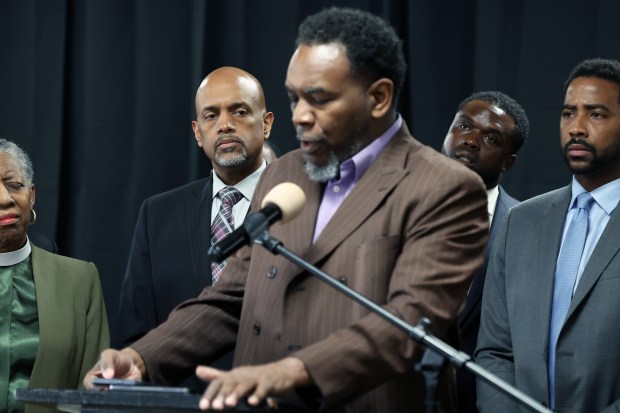
The 2020 primary was a big money race as well: Foxx faced a political newcomer Bill Conway, a former prosecutor and Navy veteran who received a total of $10.5 million from his father, William E. Conway Jr., as well as $250,000 from Citadel founder Ken Griffin.
Foxx was still equipped to play defense. She received $1 million each from local Democrats Michael Sacks and Fred Eychaner, as well as a combined $850,000 from affiliates of SEIU, the Chicago Teachers Union, the Chicago Federation of Labor and other public sector unions like AFSCME. National liberal megadonor George Soros also steered $2 million to a political action committee to defend her.
Those same forces did not materialize for Harris. SEIU affiliates and the CTU did contribute to him, but their $200,000 was not close to the support Foxx garnered in 2020. CTU, one of the most vaunted political field operations in the city, also put more focus on the Bring Chicago Home referendum and the Illinois Senate race between Graciela Guzman and Natalie Toro, political operatives said.
While Eychaner gave Harris $157,000, Sacks — who had worked with Foxx when she was Preckwinkle’s chief of staff — has not made major campaign outlays since joining the host committee for the Democratic National Convention. Soros and other national progressive prosecutorial donors and organizations also stayed out.
Other high-profile progressive prosecutor races in Los Angeles, Houston and Austin, Texas, “had taken a lot of energy,” Foxx said. “I think this race did not rise to the same level of attention that those races did.”
O’Neill Burke’s contributions from business interests — local restaurateurs and investment firm leaders alike — included those who have given to both Democrats and Republicans. Between July and April, she raised $3.4 million, according to state records.
Harris raised $1.3 million in the same span, cash that “came in late and at a much lower rate, making it more difficult to respond to attacks,” spokeswoman Joanna Klonsky said. Taken with the lack of engagement from national donors “with a differential this small, that lack of support was a missed opportunity to make a substantial impact here.”
“There are 2,700 precincts in the county and we lost by less than one vote per precinct,” said Cook County Democratic Party Chair Toni Preckwinkle, an early Harris supporter. “We got outspent by $2 million, and it was a lot of Republican money that came in at the very end.”
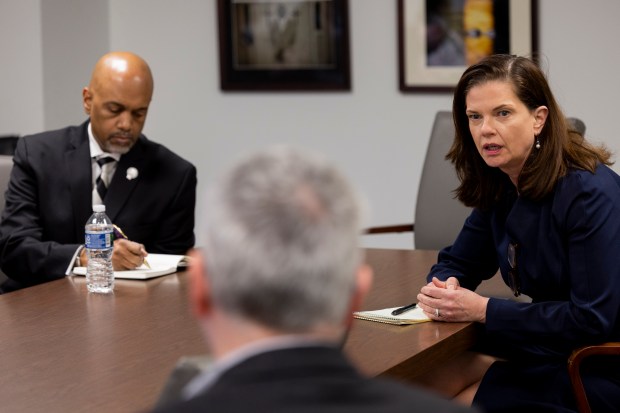
Those funds allowed O’Neill Burke to fill airwaves and mailboxes with ads about her courtroom credentials and status as a departure from Foxx, while portraying Harris as a corporate lobbyist and political insider aligned against workers’ rights and abortion access. In the waning days of the campaign, Harris and surrogates said they had to work to knock down those attacks as misleading. The abortion rights group Personal PAC echoed their concern, saying the ads about choice were “disheartening” given “abortion access is under attack all across the country.”
The state’s attorney’s office rarely intersects with abortion issues. O’Neill Burke’s pro-abortion-rights promises — that she would defend the county, patients and protesters against attacks — were likely effective with women, said O’Neill Burke campaign spokeswoman Aviva Bowen, but just one in a constellation of factors that swayed voters.
John Catanzara, the controversial head of the local Fraternal Order of Police, also took credit for pushing O’Neill Burke over the line. He encouraged union members to pull Democratic — rather than Republican — primary ballots to support her. To what extent Republicans crossed over won’t be clear to the campaigns until voter files are updated, operatives said.
O’Neill Burke rejected Catanzara’s endorsement as professionally improper last month, but told reporters Monday that “if anybody went out and voted for me, feel free to take credit for it … because each and every vote mattered in this one.”
Some of O’Neill Burke’s heaviest areas of support were in Chicago wards typically home to first responders.
She also dominated across much of the northwest and southwest suburbs and outperformed expectations in progressive bastions, Bowen said. “She won the 47th Ward, New Trier, garnered significant shares of the vote in the 1st, 22nd, 40th and 46th wards, Oak Park and Evanston. I also think she did respectably in Black communities.”A WBEZ analysis of demographic data from precincts across the county found Harris won 76.6% of majority-Black precincts, short of Foxx’s 83.5% take in 2020.
“I think that people everywhere are concerned about violence and crime in their communities. And I think it was a question of messaging,” O’Neill Burke told reporters Monday when asked about low support for her on the South and West sides. “I think a lot of the concern was unfair, that I was going to be very hard on crime. I want to be effective. That doesn’t mean we’re going to lock everybody up. That means we’re going to implement programs that get people turned around. That’s my goal.”
Foxx said the demographic breakdown of the vote was unsurprising, but suggested those most affected by crime support a more nuanced and less rigid approach.
“I look at the wards and see where (Harris) carried in the city, those Black wards that have direct contact with the criminal justice system, who have high incidences of violence in their community, that those wards — with all the noise and rhetoric — still came out and said this is our candidate, it does say something,” Foxx said.
Scroll through the maps to see Democratic primary race results for Cook County state’s attorney in the 2016, 2020 and 2024 elections. Search by precinct or click on the map to see the vote share there.
Even so, Foxx told the Tribune she was frustrated that the racial impacts of tough-on-crime policies like low retail-theft thresholds were not fully addressed in the campaign, adding that her frank discussions of both concentrated violence and wrongful convictions resonated with Black voters. “When we pretend race in the system is not a thing, we go backwards,” she said.
Though Fioretti faces long odds in a county that has not elected a Republican to the office in more than two decades, he has already gone on the attack, describing his opponent as duplicitous. An attorney and former alderman, Fioretti previously ran for state’s attorney, Cook County Board president and state Senate as a Democrat.
In a Monday release, he said O’Neill Burke both “praised law enforcement or rejected their support, pretended to be a law-and-order candidate or a ‘Kim Foxx Lite’ candidate.”


